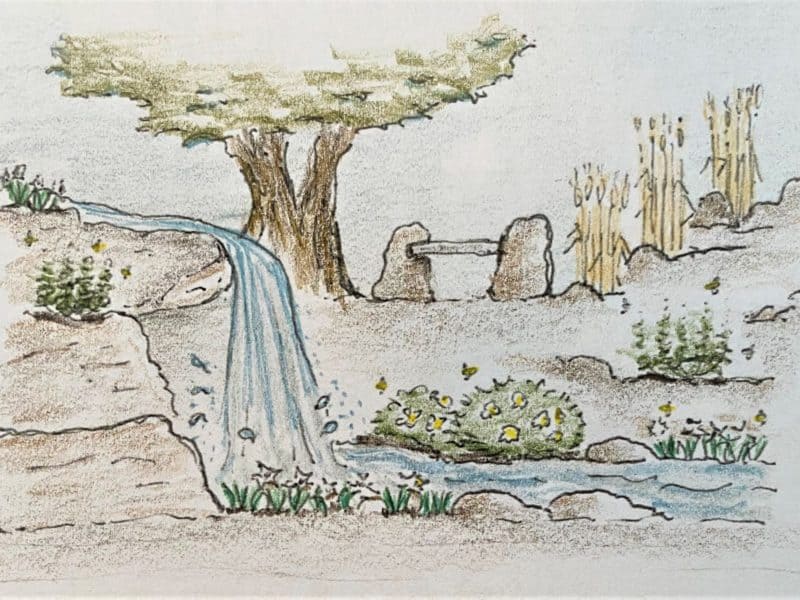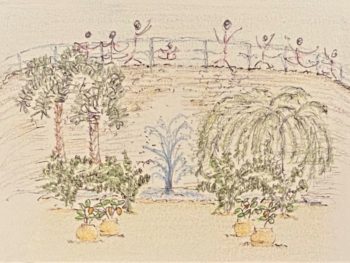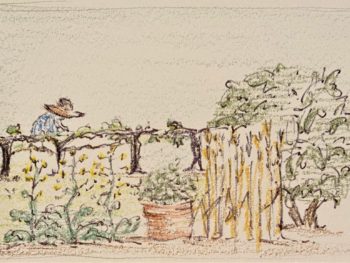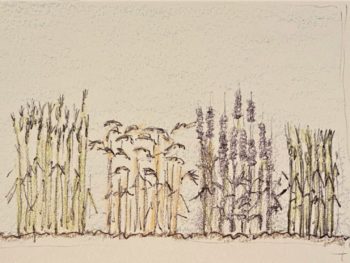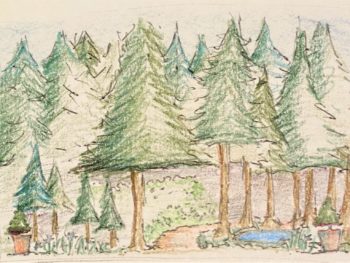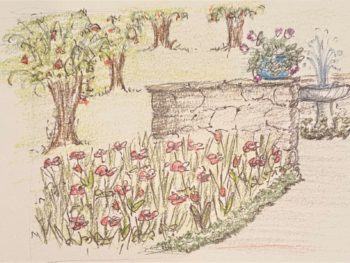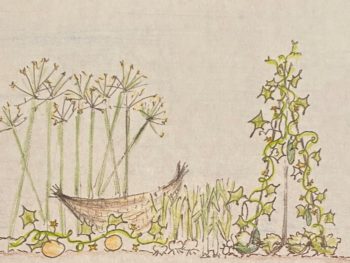In our second week of Prophets & Leaders Bible Garden Design, we are already taking an unexpected turn as we create a rock garden for the prophet Samuel. The guiding Word for this adventure from Acts 3:19-26 leads us into the landscapes of the holy prophets, first naming Moses, “For Moses said…” (Acts 3:22 NIV) and next naming Samuel: “Indeed, beginning with Samuel, all the prophets who have spoken foretold these days.” (Acts 3:24 NIV).
click here to return to the first Bible Garden Design – Moses’ Murmuring Vegetables
To Samuel’s life we go, except…Lord, there is not a garden to be found in the book of 1 Samuel! And hardly a plant list either?! Though we will certainly see plenty of stones and rocks! LOL, the Lord’s sense of irony strikes again: Looks like we will be working from the premise of creating something out of nothing. Although this is familiar God-ground, as each of us were sculpted from nothing into something (Psalm 139:15 The Message), a recurring pattern in the way the Lord works.
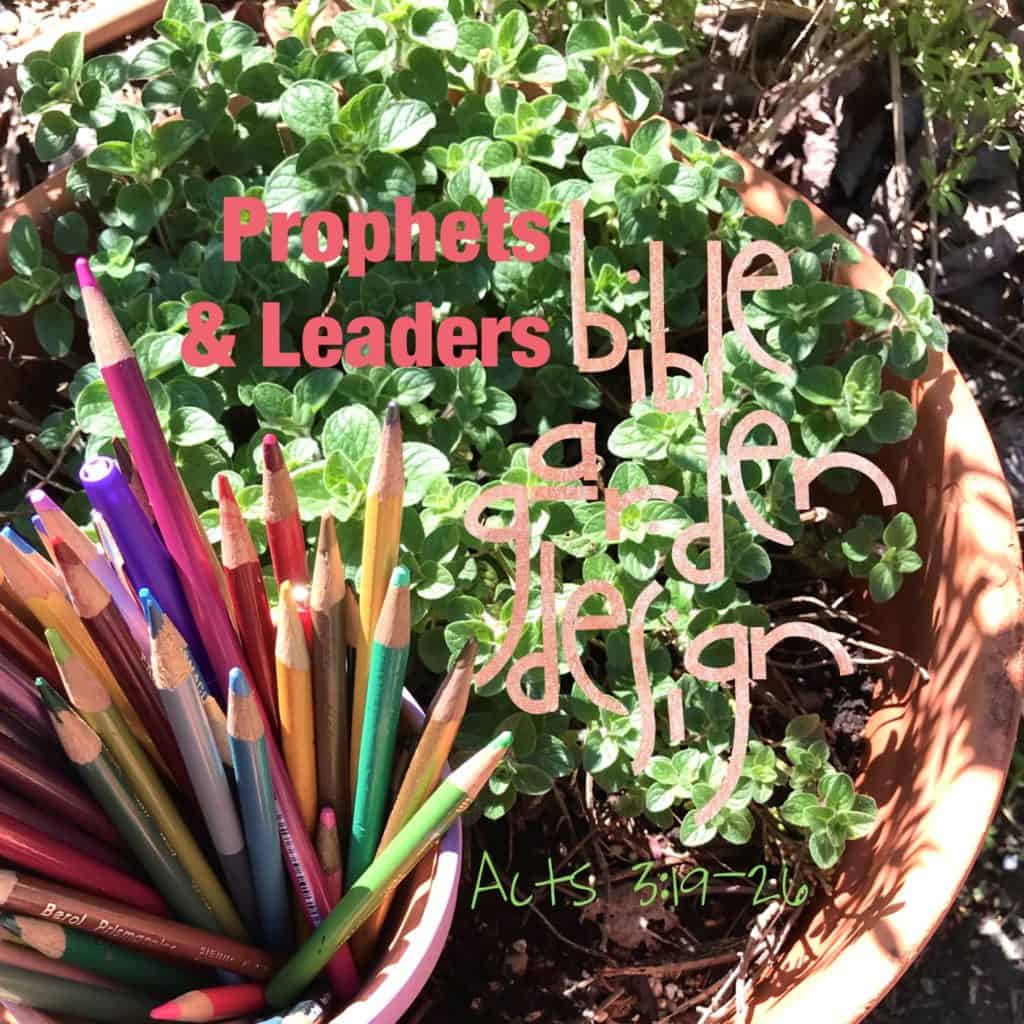
For your design of Samuel’s Rock Garden, find a breezy glance and a deeper gaze, and take in whichever fits your timing:
Schematic Design will highlight key elements, complimented with a Deeper Dig into the background story if you have time for more reading.
Plant Palate will recommend plants to feature, with a Scripture Guide at the end if you would like to see the plants as they are written in verse.
Landscape Views will offer glimpses of gardens and landscapes as possible examples
Words for Lent will offer further insight for the Lenten season into the relationship of the featured prophet or leader with repentance, his Reflections of the Messiah appointed for you, and the Time of Restoration spoken of by the holy prophets, guided by Acts 3:19-26.
Samuel’s Rock Garden
Though he mentioned no garden visits or vistas, Samuel’s life was significantly grounded in the landscape of Israel, as the text of 1 Samuel emphasized first-off that his parents resided in the hill country of Ephraim. This rocky terrain was located in the heart of the land promised to Abraham’s offspring. Plants mentioned in his account were few, yet the traverses of Samuel and others in the narrative across the territory were many. Overlay coming and going through the stony countryside with his prayer heritage from his mother, Hannah, who proclaimed “…there is no Rock like our God,” and begin to imagine that a a rock garden is a poignant, earthy expression honoring Samuel.
Schematic Design
Samuel took his place as Israel’s leader and prophet when he assembled all Israel and prayed on their behalf for help from imminent attack. The Lord responded with deliverance, and the prophet marked the answered-prayer-triumph with a stone. He named it “Ebenezer,” meaning “stone of help” in Hebrew. Let the solidity of this stony witness create the identity of this landscape space as a rock garden, enhanced by his mother’s prefacing Rock-like-our-God proclamation.
Join Samuel’s deep, prayerful cries to the Lord with his mother Hannah’s heart-pouring-out prayers and carve out a watercourse through the garden space, with water pouring over ledges to symbolize these prayerful postures. Make it a moving current, however, as the Lord goaded to Samuel to move forward despite his despair over the direction Saul’s leadership took, see 1 Samuel 16:1.
Two trees make cameo appearances throughout the book, which could be featured as promontories planted with a pomegranate tree from 1 Samuel 14:2 and the evergreen oak of Tabor in 1 Samuel 10:3. Colder hardiness zones could substitute and interpretative weeping willow. Add stone benches or rock ledges for sitting, and create places where visitors might pause to pray.
A brief contextual mention of the typical Israelite homestead—[wheat] fields, vineyards, and olive groves in 1 Samuel 8:14—can add background plantings to the garden space.
Again, the deep anguishing prayers of Hannah can be featured in combination with the olive groves to serve as a foreshadowing of Christ’s troubling, rock-bottom prayers on the eve of his crucifixion at the Mount of Olives, a geography also holding the heaving prayers of David in 2 Samuel 15:30.
Soldiers under Saul’s command found honey oozing on the ground in Samuel 14:25-26, hinting to abundant flowering plants and shrubs that would have supplied pollen to the bees. Borrow rockrose from Genesis 43:11, Madonna lilies from Song of Songs 6:2, hyssop from David’s Psalm 51:7, star of Bethlehem from 2 Kings 6:25, myrtle from the ravines of Zechariah 1:8 to add pockets of flowers and pollinator sources among the rocks.
Additionally, the great David and Goliath battle told in 1 Samuel 17 occurred in the Valley of Elah, named for terebinth trees. This dramatic, deciduous species is rare in North America, yet related to the Chinese pistache and the pistachio tree. Don’t miss the detail that David triumphed over Goliath with a stone!
Terrain: Capitalize on changing elevations and stony, hard-to-plant ravines by creating this rock garden, providing shelter from sunny exposures with terraced, tree-shaded seating spots. The hill country of Ephraim and neighboring Benjamin receive considerably more rainfall than the arid, desert regions to the south, so among rocks and gravel pathways, plant plenty of greenery.
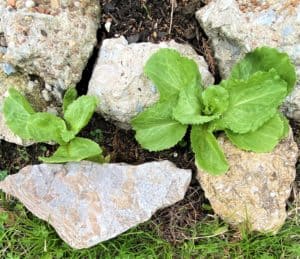
Plant Palate
links provided will take you to cultural information in the Plant Guide
Plants named in 1 Samuel:
Vines: grapevines
Grains: wheat
Trees: pomegranate, olive, Tabor oak, terebinth
Plants implied in 1 Samuel imagery:
Vegetables: chicory, endive, dandelion, lettuces (from Hannah’s bitter weeping)
Desert Plants: wormwood (from Samuel’s warning not to turn away from God)
Flowering plants: rockrose, hyssop, lilies, star of Bethlehem (from the honey Jonathan found to eat)
Riparian plants: willow, myrtle (from ravines traversed by Saul and David)
Landscape Views
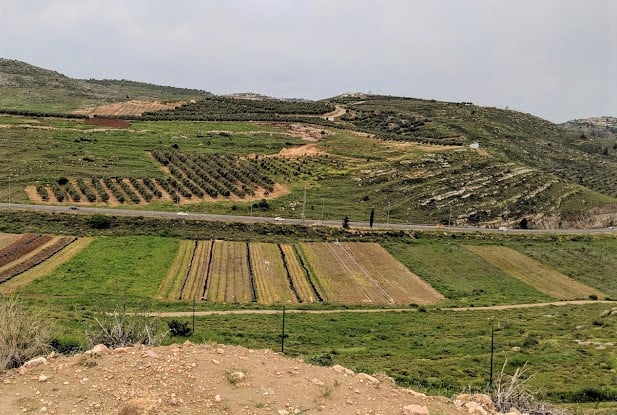
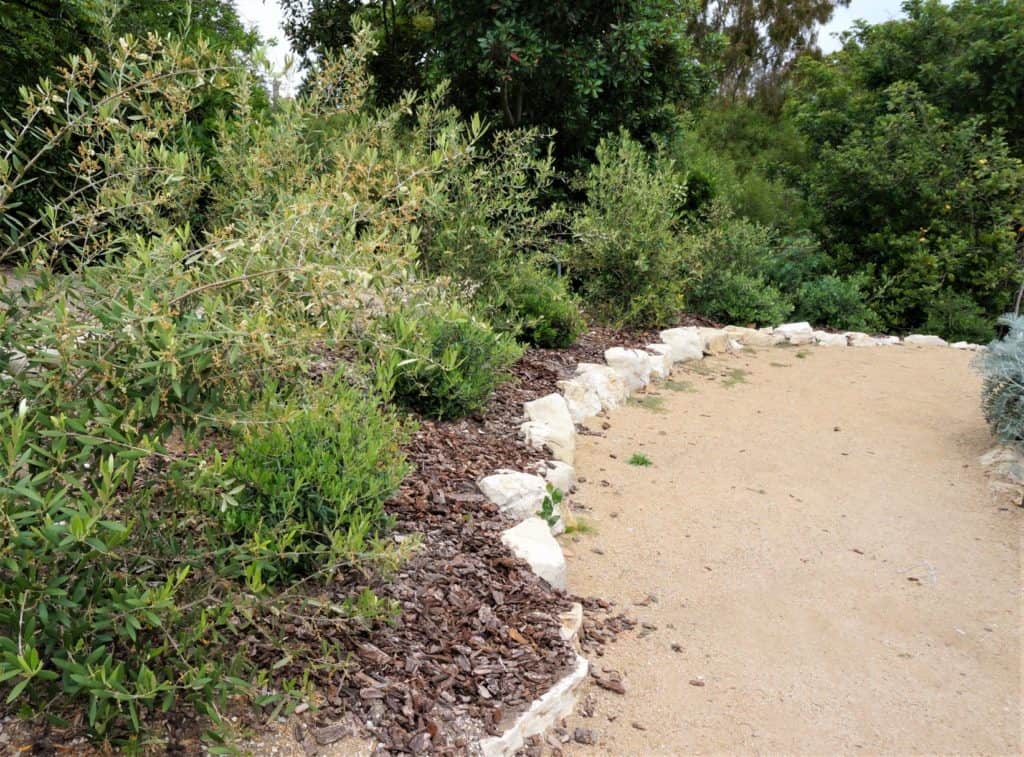
Deeper Dig into Samuel’s Leadership
The story of Samuel began before Samuel was born, with the soul-crying, heart-anguish of his mother Hannah’s barrenness. She unashamedly poured out her longings before the Lord. Never mind that her priest thought she was drunk; her hurt was irrepressible, and her desire for the righteousness of loving-marriages-producing-offspring overpowering. How she ached for what ought to be, she and Elkanah parents of their own precious family.
And God answered! Hannah became mother to Samuel—and a fertile five more after him!—and her encounter set up a succession of connect-the-dots story elements that traced in the course of time to the birth of our Savior Jesus…something sculpted out of nothing, indeed!
In the meantime, Samuel’s life was marked by an asked-and-answered relationship with the Lord, as his name was chosen “because I asked the Lord for him.” Samuel grew up in devotion to God under the guidance of priest Eli at Shiloh. He was trained in listening and taught how to respond to God: “Here I am,” he replied wholeheartedly to the Lord’s call; and “Speak, for your servant is listening.”
He soon became well-known in his own right as an intercessor, revealed in two landscape-themed instances. First, the Ebenezer stone signified his seeking the Lord’s help (noted above); second, the thunderstorm he called down upon the wheat harvest enforced the seriousness of turning to God. Rainfall on a ready-to-harvest wheat crop wipes out its yield, causing lodging (stalks breaking under pounding raindrops) and mildew growth from moisture trapped on stored grain fruits. The Israelites knew this, horrified that their sin incited Samuel to ask for such disaster, panicked at their sustenance destroyed, and desperate for Samuel to pray that they would be saved from death.
Samuel capitalized on their captive attention to warn them never to turn away from the Lord, knowing their tendency in being led by a human king would be to lazily lean on a leader instead of Him. A wormwood moment, as Moses had foreshadowed! By contrast, Samuel showed the seriousness of his commitment to God, not failing to pray for them.
Throughout Samuel’s account, we have many city names to help track the story through the land, yet it was Moses’ poetic words perhaps most telling of the landscape: “a land of mountains and valleys that drinks rain from heaven”…”a land of brooks of water, of fountains and springs, flowing out in the valleys and hills.” My experience reading back-to-back through Samuel’s two books, moving back and forth between my Bible and topographical maps of Ancient Israel, tracing Saul and David and Jonathan’s seemingly endless trails, searching for towns and pinpointing positions, I felt exhausted…as if I had been hiking up and down hilly terrain for hours, ha!
The Lord used Samuel’s devotion and prayer covering to usher Israel into an era of life under kingly rule, a succession of sovereigns who led Israel up and down a rocky history of following God’s ways, then abandoning them for evil. Samuel anointed the first two regal rulers, Saul and David, and sure enough, Saul faltered in following God’s Words, while David devoted himself to the Lord with all his heart. Despite the back and forth, the Lord’s word to Samuel was clear: keep moving. The Message translates it most intensely, I think: God addressed Samuel: “So, how long are you going to mope over Saul? You know I’ve rejected him as king over Israel. Fill your flask with anointing oil and get going (1 Samuel 16:1-2).
At one point, Jonathan and his troops entered a wooded glen and discovered abundant honey. This is a pleasant, passing reflection of the sweet family birthright the Lord intended all along in His moniker “a land flowing with milk and honey.” Hunger for this righteous legacy resounded in Hannah’s prayers, all the while foreshadowing a Child to come. Honey, after all, is a food for bee babies, created from bees’ foraging pollen in a landscape filled with flowers. Background to the entire saga of the birth of Israel’s monarchy is the livelihood of farming families, who terraced the sloping hillsides, sculpting space for fields, vineyards, olive groves, and generations of godly offspring.
Likewise, Samuel faded into the background of his own narrative. David briefly consulted him during his lengthy evasion of Saul’s relentless strike, Israel mourned his death and buried his body in Ramah, his hometown. Yet via his fierce devotion, his mother’s Rock-prayer legacy endured, spoken strong as ever in the end-of-story praises of King David:
Adonai is my Rock, my fortress and deliverer, the God who is my Rock, in whom I find shelter, my shield, the power that saves me, my stronghold and my refuge. (2 Samuel 22:2-3 CJB)
Read the full tale of Samuel’s life in the book of 1 Samuel
Rock Garden Scripture Guide
a quick reference of verses mentioning plant material (and rocks and stones!):
For the Lord your God is bringing you into a good land, a land of brooks of water, of fountains and springs, flowing out in the valleys and hills…
Deuteronomy 8:7 ESV
But the land you are crossing the Jordan to take possession of is a land of mountains and valleys that drinks rain from heaven.
Deuteronomy 11:11 NIV
… Lest there should be among you man, or woman, or family, or tribe, whose heart turneth away this day from the Lord our God, to go and serve the gods of these nations; lest there should be among you a root that beareth gall and wormwood.
Deuteronomy 29:18 KJV
There was a certain man of Ramathaim-zophim of the hill country of Ephraim whose name was Elkanah the son of Jeroham, son of Elihu, son of Tohu, son of Zuph, an Ephrathite.
1 Samuel 1:1 ESV
Now the people of Beth Shemesh were harvesting their wheat in the valley, and when they looked up and saw the ark, they rejoiced at the sight.
1 Samuel 6:13 NIV
Then Samuel took a stone and set it between Mizpah and Shen, and called the name of it Ebenezer [that is, The stone of help], saying, “Hitherto hath the Lord helped us.”
1 Samuel 7:12 KJ21
So Samuel told all the words of the LORD to the people who were asking a king from him. He said, “These will be the ways of the king who will reign over you: he will take your sons and appoint them to his chariots and to be his horsemen… and some to plow his ground and to reap his harvest…He will take the best of your fields and vineyards and olive orchards and give them to his servants. He will take the tenth of your grain and of your vineyards and give it to his officers and to his servants.
1 Samuel 8:10-11..12..13-14 RSV
Then you shall go on from there further and come to the oak of Tabor; three men going up to God at Bethel will meet you there, one carrying three kids, another carrying three loaves of bread, and another carrying a skin of wine.
1 Samuel 10:3 RSV
“…Now is wheat harvest time, isn’t it? I [Samuel] am going to call on Adonai to send thunder and rain. Then you will understand and see how wicked from Adonai’s viewpoint is the thing you have done in asking for a king.”
1 Samuel 12:17 CJB
“Do not be afraid,” Samuel replied. “You have done all this evil; yet do not turn away from the Lord, but serve the Lord with all your heart. Do not turn away after useless idols
1 Samuel 12:20-21 NIV
And Saul tarried in the uttermost part of Gibeah under a pomegranate tree which is in Migron: and the people that were with him were about six hundred men
1 Samuel 14:2 KJV
The entire army entered the woods, and there was honey on the ground. When they went into the woods, they saw the honey oozing out.
1 Samuel 14:25-26 NIV
And Saul and the men of Israel were gathered, and encamped in the Valley of Elah, and drew up in line of battle against the Philistines.
1 Samuel 17:2 ESV
Then he picked up five smooth stones from a stream and put them in his shepherd’s bag and, armed only with his shepherd’s staff and sling, started across to Goliath.
1 Samuel 17:40 TLB
Words for Lent
In this Lenten season of turning from our ways to God’s—
“Now it’s time to change your ways!
Turn to face God so he can wipe away your sins,
pour out showers of blessing to refresh you,
and send you the Messiah he prepared for you, namely, Jesus.”
Acts 3:19-20 The Message
—let us linger in Samuel’s astute analysis, spoken to Saul whose deadly struggle with listening and following the Lord is something we can learn from.
Then Samuel said,
Do you think all God wants are sacrifices—
empty rituals just for show?
He wants you to listen to him!
Plain listening is the thing,
not staging a lavish religious production.
1 Samuel 15:22 The Message
We pray to emerge from this Lenten period not with a strengthened will power or sense of accomplishment, but with a deeper awe of the Lord—our turnabout, transforming renewal, making us ready to listen to Him. May we then move more deeply in delight of the freedom He won for us in his death and resurrection, celebrated at the end of this repentant period.
Samuel’s Reflections of the Messiah
Samuel’s mother’s prayers were spoken similarly to Jesus’ mother’s prayers.
Hannah prayed and said, “My heart exults in the Lord; my strength is exalted in my God. My mouth derides my enemies, because I rejoice in my victory.
1 Samuel 2:1 NRSV
Response:
Then Mary said, “My soul praises the greatness of the Lord! My spirit exults in God, my Savior, because he has looked favorably on his humble servant. From now on, all generations will call me blessed…
Luke 1:46-48 ISV
Samuel’s growing up was described similarly to Jesus’.
And the boy Samuel continued to grow in stature and in favor with the Lord and with people.
1 Samuel 2:26 NIV
Response:
And Jesus grew in wisdom and stature, and in favor with God and man.
Luke 2:52 NIV
Samuel’s Reflections of the Time of Restoration
When it was Samuel’s time; that is, when all that he had learned, discerned, and grew up in— together with the prayers spoken over his life—was given the time and place to pour out, he cried out to the Lord on Israel’s behalf, and the Lord answered him (1 Samuel 7:9). He reflected this mighty move in his words, “Thus far the Lord has helped us.” Come to see this as a never-ending truth, the Lord’s constant and continuing deliverance and triumph, all the way to a complete restoration, as Samuel declared:
…the Splendor and Glory and Eminence of Israel will not lie or change His mind…
1 Samuel 15:29 AMP
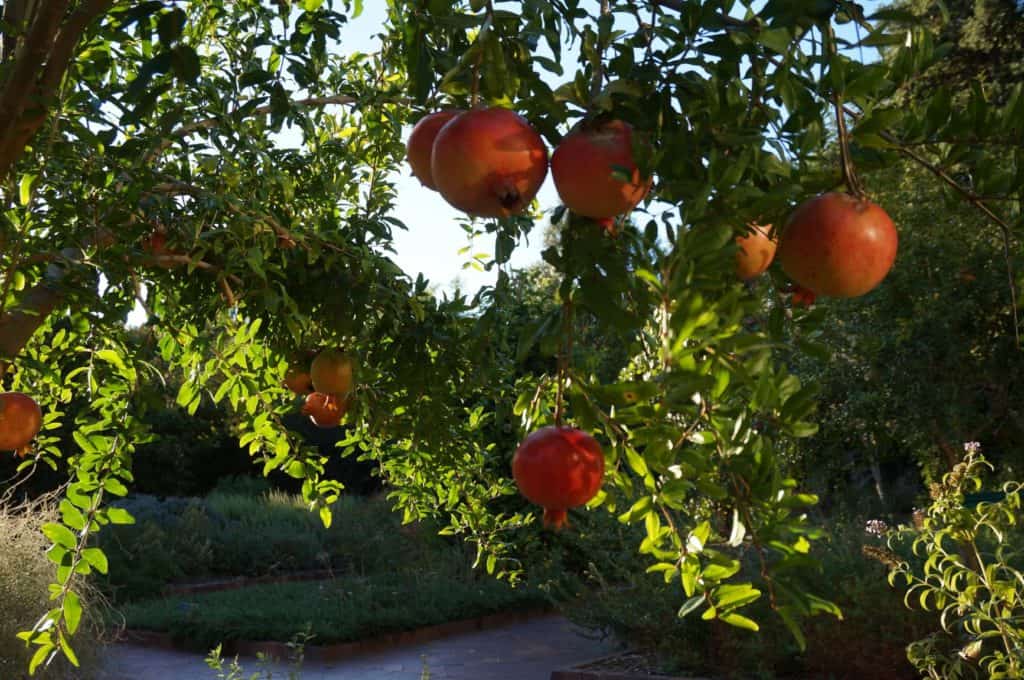
Further Study:
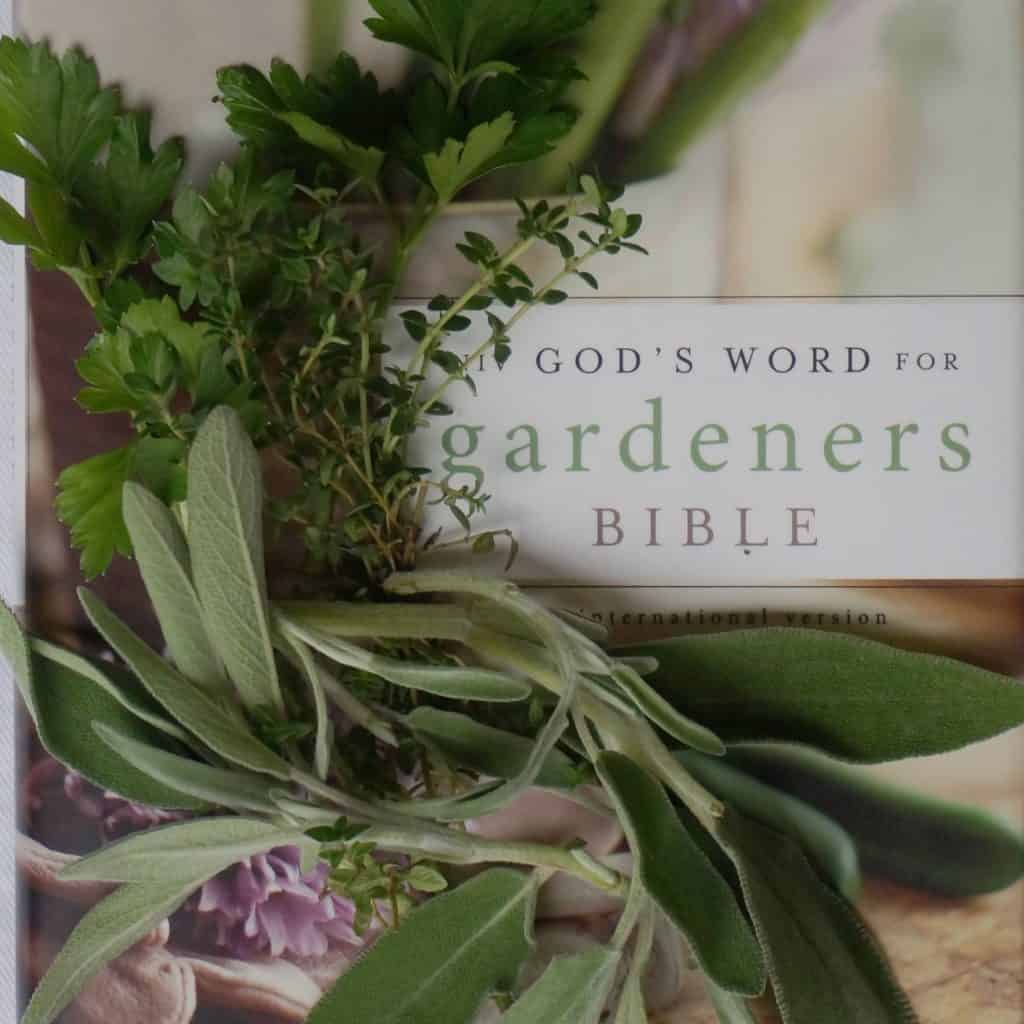
Dig into more devotions in the Garden Tour section of God’s Word for Gardeners Bible on the Promised Land, beginning on page a-15
Find related content in devotions on Choosing, featuring Olive trees on page a-20, and Weeding, featuring wormwood on page a-28
See the Plant Index for a complete list of all the mentions of plants in God’s Word for Gardeners Bible, www.gardenindelight.com/plant-index-gods-word-for-gardeners/
Find a Biblical plant bibliography in Plant Resources, www.gardenindelight.com/plant-resources/
Photo Credits & sketches
©2015-20 Shelley S. Cramm (except the Shiloh landscape image as noted)

